#and for supergiant to roll out with the next update
Explore tagged Tumblr posts
Text
i need the waxwitch agenda to spread so bad. yes i know you can only meet icarus after beating chronos and you only see him in the furthest zone on the surface so far. yes i know you have to get there multiple times to piece together his backstory with mel. yes i know his storyline is barely finished and he can't show up at the crossroads and he doesn't even have a 3d model or finished character art. i can wait patiently
#i can't recommend watching the all icarus interactions compilation bc ik a lot of ppl are like#playing the game as normal and unfolding all the story as it was meant to be unfolded#ITS FINE#I CAN WAIT SO PATIENTLY FOR PEOPLE TO GET AROUND TO THEM#hades game tag#hades 2 spoilers#waxwitch#hades 2#icarus#edit: ok you don't have to beat chronos to see him but my point still stands#i just have to wait for everyone to discover him#and for supergiant to roll out with the next update
198 notes
·
View notes
Text
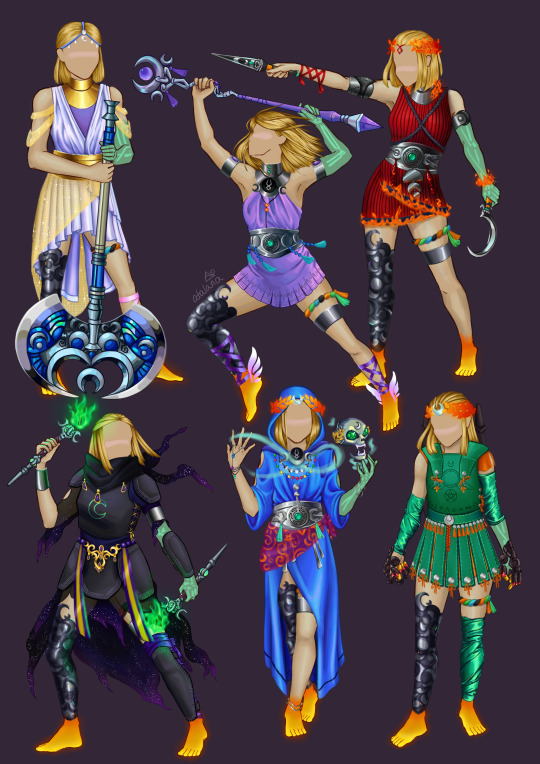
Blessings of Arachne
[SCARLET] [MOONLIGHT] [LAVENDER] [AZURE] [EMERALD] [ONYX]
happy one year anniversary to the hades 2 early access (give or take a week), and also happy anniversary to me starting this piece!
i've been a supergiant fan since transistor, which doesn't feel like that long but in retrospect was forever ago, and it's been so great watching the fandom get so much bigger since the success of hades. all their games are so beautifully made i always get inspired to do fanart near immediately, and within hours of hades 2's release (my first time in arachne's room), i was already planning out designs for these
it's been a tough year health wise, so it was a very slow labour of love (and you can see my art skills developing in real time through this piece), but i'm so so proud of the final result
so these are how i envision each of the dresses you can get from arachne! originally not all of these poses included weapons, but once we got the skull and the coat it felt too perfect not to include those, so i shuffled things round a bit
i'm gonna make posts for each of these outfits individually explaining my design choices and what went into these, and will be rolling those out over the next few days (check back to the og of this post for the most updated links), but for now enjoy the full finished painting!
#and it goes without saying you probably wanna full view this#fun fact: file size too large to send over discord!#but no seriously this has been my focus for 12 goddamn months and look at how it turned out!!!#very happy with this so you are going to be seeing it a lot#hades 2#supergiant games#hades supergiant#melinoe#my art
178 notes
·
View notes
Text
The Red Herb’s Top 10 Games of 2020
Hey, fuck 2020. You might notice that many of the “Best Of” lists you read this year and last can’t help but mention how terrible 2020 was. That’s because every day was like hitting a new, splinter riddled branch on our 365 day plummet off a shit-coated tree. The year brought with it a viral pandemic that served as a pressure cooker for the societal and systemic issues boiling beneath the surface of our every day life. And we’re not out of it.
At least one positive holds true of 2020: the games were pretty darn good. One has to wonder, though, if 2020 was the last year of what can be called “normalcy” for the video game industry. Now that the remainder of titles brewed in pre-Covid times are out in the wild, what will the future of gaming look like as studios shift to work-from-home and distribution models migrate to digital as the primary bread winner? What will games look like going forward?
I have no fucking clue. We’ll get there when we get there. But looking back, I’m glad to have had such solid distractions from the stress and strife. If 2020 is any indicator for the industry going forward, then my takeaway is that games will continue to grow in prominence because of their ability to help us cope and, more importantly, stay connected.
Anyway, here’s video games:
10. MARVEL’S AVENGERS
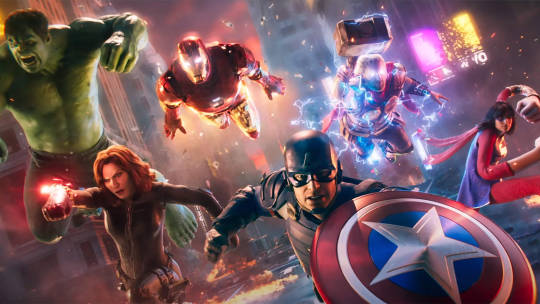
Oh, Marvel’s Avengers. I know you expected to be on more prestigious Top 10 lists than mine. Truthfully, I debated whether or not you should be here. But I had to search my soul (stone) on this one. Really assemble my feelings. Tony Stark my thoughts (?). Here’s the short of it: Marvel’s Avengers has a great story campaign with a surprising amount of emotional weight thanks largely to Kamala Khan’s quest to reassemble the heroes of her youth. Once the final cutscene ends, though, players were expected to take their play box of Marvel heroes, jump online, and duke it out against hordes of villains for the privilege of precious loot and level gains. It would be impossible to get bored because Crystal Dynamics was going to continually Bifrost in new quests, cosmetics, and heroes -- for free!
Except, after fans blasted through the campaign (took me a solid weekend), they found a multiplayer mode filled with repetitive fights against non-descript A.I.M Bots, a handful of dull, un-Marvelous environments (the PNW?! In a video game?! Wowwee!), and a grind for gear that became useless minutes after it was equipped. Oh, and bugs. Tons of bugs. It must be hard for A.I.M. to take earth’s mightiest heroes seriously when they’re falling through the fucking earth every other mission.
So why the Kevin Accolade™? Of all the mistakes and underbaked ideas, Crystal Dynamics got the most important thing right: they made me feel like I was a part of the Avengers. Cutting through the sky as Iron Man; dive bombing, fists-first as the Hulk; firing gadgets at cronies as Black Widow; cracking a row of skulls with Cap’s shield… Avengers is a brawler on super soldier serum.
The combat is crunchy and addictive, and surprisingly deep once you unlock your character’s full suite of skills and buffs. The gear matters little. But choosing a loadout that works for you -- like ensuring enemy takedowns grant you a health orb every time or turning area clearing attacks to focused beams of hurt -- does matter. When it comes to games with disastrous launches, Avengers is the most deserving of a triumphant comeback story because, if you clear the wreckage, I think there’s a solid game here. If I was able to spend hours playing it in its roughshod state, I can see myself digging in for the long-term once it’s polished up and given a healthy dose of content. You know...if Square Enix doesn’t outright abandon it.
9. STREETS OF RAGE 4
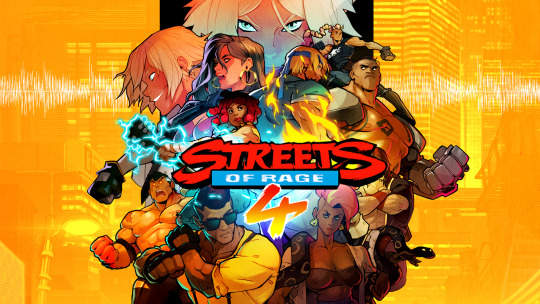
Here’s a fact about me: I love beat ‘em ups. From Final Fight to X-Men to The Simpsons, I prioritized my quarters for the beat ‘em up machines (and House of the Dead simply because House of the Dead fuckin’ owns). Unfortunately, Streets of Rage wasn’t in arcades, and I didn’t own a Genesis growing up, so I didn’t get around to the series until Sega re-released as part of a collection. Though my history with the 29 year old brawler is shorter than some, the basics stand out out right away: it’s an awesome side-scrolling brawler filled with zany character designs and high octane boss fights.
SoR4 nails that simple spirit while adding an electric soundtrack, buttery smooth animations, and an art style that looks like a comic book in motion. You can button-mash your way through the game or master your timing to combo stun the shit out of bad guys. Same screen co-op is a requisite for the beat ‘em up genre but I have to call it out nonetheless given that it's next to obsolete these days. The story campaign is, of course, finite but a stream of unlockables and a Boss Rush Mode pad out the package nicely.
I really don’t have to go on and on. I’m on board with any game that captures the arcadey high of classic beat ‘em ups, and Streets of Rage 4 does it with flare.
8. RESIDENT EVIL 3 REMAKE
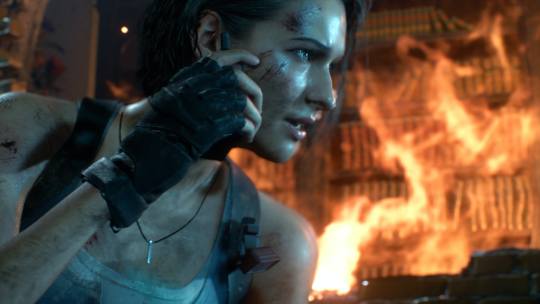
Resident Evil 2’s remake was my game of the year in 2019. It’s a pitch perfect revision that captures the pulse-pounding fear of the original while beautifully updating its graphics and gameplay for modern audiences. The most striking aspect of RE2’s remake is how it expands and reconfigures the classic game’s environments and set pieces. Capcom managed to recontextualize, and even improve on, the original’s design while staying faithful to its tone and atmosphere.
Resident Evil 3’s remake is less successful in modifying and improving on its source material. If the game feels like it was handled by a different team than RE2R, your gamer hands have good eyes (roll with it). It was developed by a separate internal team (three different teams, in fact), but that’s actually one of many choices mirroring its 1999 forebear. Just like the original, RE3R is a tighter (i.e. shorter) experience that launched less than a year after its predecessor. And just like the original, the game skirts away from survival horror in favor of action horror.
Unlike last year’s remake, however, RE3R paints in broad strokes with the original material much in the same way that 2004’s Dawn of the Dead remake shared a vague resemblance with Romero’s ‘79 classic. Capcom at least nails down what matters: you play as Jill Valentine, beaten and discredited after the Arklay Mountains incident, during her last escape from the zombie besieged Raccoon City. Her exit is complicated by Nemesis, a humanoid missile that relentlessly pursues her from minute two of the game. Her only chance of making it out alive is by teaming up with a gaggle of Umbrella dispatched mercenaries, including an overly handsome fellow named Carlos Oliveras that you control for a spell. But fans struggled to get over what Capcom didn’t remake. Several enemies, boss fights, and a “divergent path” mechanic that had you choose how best to escape the Nemesis in a pinch were omitted from the remake. Even an entire section set in a clock tower was cut. But, let’s be honest, the biggest omission is a secret ending where Barry Burton saves the day using only his beard. For real, YouTube that shit.
If you look at what the remake does instead of what it doesn’t, you’ll find a lightning paced action game highlighted by tense, one-on-one fights against the constantly mutating Nemesis. The tyrant’s grotesque transformations evoke the mind-rending, gut turning creature designs found in John Carpenter's The Thing. It’s sad that Nemesis doesn’t pursue you through the levels as diligently as he did in the original, or as Mr. X had in last year’s remake, but these “arena fights” end up being harrowing and fun, culminating in a memorable final encounter. The remake also treats us to the best incarnation of Jill to date. She’s a cynical badass, exasperated at how Umbrella upended her life, and can take a plunge off of a building yet still muster enough energy to call Nemesis a bitch. RE3R also shines thanks to its snappy combat, including a contextual dodge that feels rewarding to pull off, less bullet-sponge enemies than RE2, and an assortment of weapons to get you through Jill’s Very Bad Night(s). It makes for a necessary, though shorter, companion to last year’s stellar remake.
7. HADES
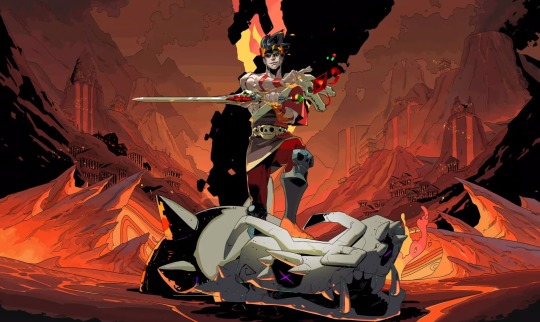
I’m experiencing a new type of shame including a title that I haven’t beaten on my Top 10 list, but I can assure you that I’ve dumped hours into its addictive death loop. It’s probably because of my resistance to looking up any tips, but given the skill-check nature of the difficult boss fights, I’m almost afraid the top shelf advice will amount to “die less, idiot.”
My failings aside, Hades is brilliant. It’s the perfect merger of gameplay and storytelling. You play as Zagreus, son of Hades, and your entire goal is to escape your father’s underworld domain. You pick from a selection of weapons, like a huge broadsword or spear, and attempt your “run,” seeing how far you can make it before an undead denizen cuts you down. It’s familiar roguelike territory, but where Supergiant separates their game from the pack is in the unique feeling of constant progression, even as you fail. With each run, not only is Zagreus earning a currency (gems or keys) that unlock new skills that make the next go a little easier, you’re also consistently treated to new lore. The fallen gods and heroes that line your father’s hall greet you after each death and provide a new insight into their world. The writing is bouncy and hilarious, the voice acting ethereal and alluring, and the character designs could make a lake thirsty.
Supergiant’s stylistic leanings are at their peak here. They’ve managed the impossible feat of making failure feel like advancement. Sure, it totally fucks up other roguelikes for me, but that’s okay. None of those games have Meg.
6. DEMON’S SOULS
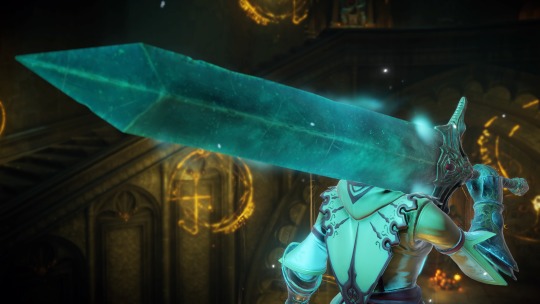
Whereas Capcom takes liberties with their remakes, Bluepoint took the Gus Van Sant approach and made a 1:1 recreation of the 2009 title that launched the “Soulslike” genre. The dividing difference is a 2020 facelift brought to us by way of the PlayStation 5’s next-gen horsepower. There’s been online arguments (surprise) regarding the loss of Fromsoftware’s visual aesthetic in translating the PS3 original in order to achieve a newfound photorealism. It’s true, some beasties lose their surreal weirdness -- a consequence of revisiting designs without the worry of graphical or time constraints -- but the game’s world is still engrossing, morbid, and bleakly gorgeous.
That’s not to say all Bluepoint did was overhaul the graphics and shove this remake out the door. No, their improvements are nuanced, under-the-hood changes that gently push the genre into the next-generation. For one, the loading times are incredible. You could hop between all five archstones in under a minute if you wanted. And this game is a best DualSense controller showcase outside of Astro’s Playroom. You can feel a demonstrable difference between hitting your sword against a wall compared to connecting it with an attacking creature. Likewise, the controller rumbles menacingly as to let you know enemies are stomping across a catwalk above you. “Better rumbles” was not on my wish list of next-gen features, but the tactile feedback goes great lengths to make you feel like you’re there.
Granted, sticking so closely to the original means its pratfalls are also carried over to the next-gen. The trek between bonfire checkpoints is an eternity compared to the game’s successors, and Fromsoftware hadn’t quite mastered the sword ballet of boss fights prevalent in Dark Souls. Instead, a handful of bosses feel more like set pieces where you’re searching for the “trick” to end it versus having to learn attack patterns and counters. Still, it’s easy to see the design blueprint that bore a whole new genre. From having to memorize enemy placements to hunting down the world’s arcane secrets in the hopes of finding a new item that pushes the odds in your favor. Bluepoint’s quality of life improvements only make it kinder (not easier) to plunge into the game, obsess over its idiosyncrasies, and begin to master every inch of it. That is until you roll into New Game+ and the game shoves a Moonlight Greatsword up your ass.
5. YAKUZA: LIKE A DRAGON
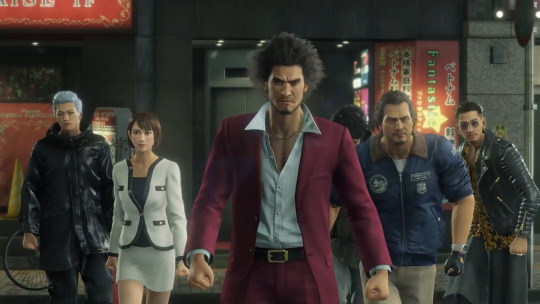
Here’s a fact about me I’m sure you don’t know: I love beat ‘em ups. Streets of Rage 4 had an easy time making it on this list because it can be classified as both a “beat ‘em up” and “good.” Here’s another fact about me: I’m not the biggest fan of JRPGs. I’m told this is not because of any personal preferences I harbor, but rather due to a distinct lack of culture. I’ve made peace with that. At least my uncultured ways are distinctive.
But my disinterest in JRPGs is notable here because it illustrates how very good Like A Dragon is. Transitioning the Yakuza series from a reactive brawler (entrenched in an open-world SIM) to a full-blown turned-based RPG was risky -- especially 8 entries into the mainline series -- but it pays off explosively for Like A Dragon. Not only does the goofiness, melodrama, and kinetic energy translate to an RPG -- it’s improved by it. Beyond a new protagonist -- the instantly likable and infinitely affable Ichiban Kasuga -- we’re finally treated to an ensemble cast that travels with you, interacts with you, and grows with you. Their independent stories weave into Ichi’s wonderfully and end up mattering just as much as his.
The combat doesn’t lose any of its punch now that you’re taking turns. In fact, it feels wilder than ever and still demands situational awareness as your enemies shift around the environment, forcing you to quickly pick which move will do the most damage and turn the fight in your favor. RGG purposefully made Ichi obsessed with Dragon Quest (yes, specifically Dragon Quest) as an excuse to go ham and morph enemies into outlandish fiends that would populate Ichi’s favorite series. It’s a fun meta that never loses its charm.
This is the best first step into a new genre I’ve ever seen an established franchise make and I hope like hell they keep with it for future outings -- and that Ichi returns to keep playing hero. There’s plenty of callbacks and treats for longtime fans, but RGG did a masterful job rolling out the virtual carpet for a whole new generation of Yakuza fanatics.
4. GHOST OF TSUSHIMA
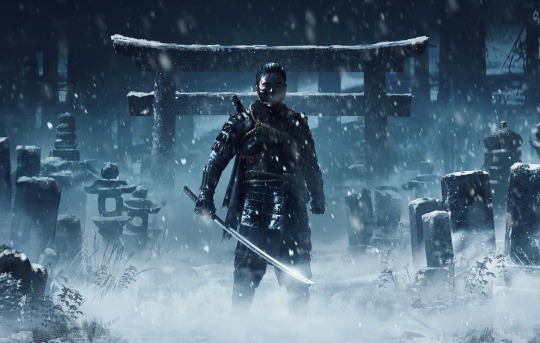
Sucker Punch’s dive into 13th century Japan doesn’t redefine the open-world genre. But like Horizon: Zero Dawn before it, Ghost of Tsushima takes familiar components of the genre and uses them exceptionally well, creating an airtight experience that can’t help but stand out. I can tell Sucker Punch mused on games like Assassin’s Creed and Breath of the Wild, tried to figure out what makes those games tick, and then brought their own spin to those concepts. You can feel it in their obsession to make traversal through the environment as unobtrusive as possible, letting the wind literally guide you to your destinations instead of forcing the player to glue their eyes to a mini-map. You can feel it in how seamless it is to scale a rooftop before silently dropping on a patrol, blade first. You can feel it in the smoothness behind the combat as your sword clashes against the enemy’s. Every discrete part is fine-tuned yet perfectly complements the whole. The game is silk in your hands.
The mainline story can be humdrum, though. It mirrors the beats of a superhero origin story, which isn’t surprising when you account for the three Infamous titles and satellite spinoffs under Sucker Punch’s belt. But Jin Sakai’s personal journey outshines the cookie-cutter plot. His gradual turn from the strict samurai code to a morally ambiguous vigilante lifestyle (to becoming, eventually, a myth) is a fascinating exploration in shifting worldviews. This is bolstered by the well-written side-missions dotting your quest, some of which play out in chains. It’s these diversions about melancholy warriors and villagers adjusting to life under invasion that end up being the essential storytelling within the game. Whatever you do, don’t skip a single one.
Before GoT can overstay its welcome with collectible hunting and stat-tree building, the ride is over. If you find exhaustive open-world titles, well, exhausting, Sucker Punch coded enough of a campaign to sticking the landing and not more. But if you were looking for more, the game’s co-op Legends mode is the surprise encore of the year. It strikes its own tone, with vibrant, trippy designs, and a progression system that embarrasses other AAA titles in the space (I mean Avengers. I’m talking about Avengers).
3. THE LAST OF US PART II
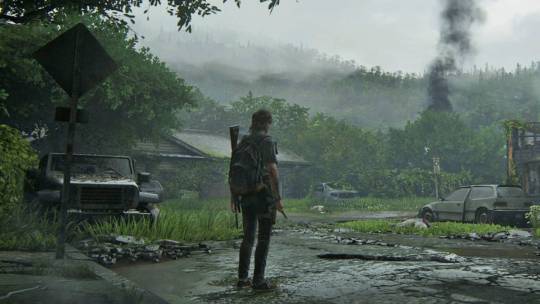
The Last of Us is widely regarded as a masterpiece. It’s a melancholic trek through a realistic post-apocalypse, driven by the budding bond between a world-weary survivor and a would-be teenage savior. The fungal zombies and violent shootouts with scavengers were scary and exciting, but ultimately just window-dressing compared to the level of complicated, and honest, human emotion on display throughout the tale. While a segment of detractors helpfully pointed out that The Last of Us’ story isn’t unique when compared to years of post-apocalyptic books, comics, and movies, that argument seems to forget that a narrative more concerned with the human protagonists’ connections to one another instead of saving the world or feeding into a hero complex is pretty unique for games -- especially a high profile, AAA budgeted game.
Still, fans made heroes out of Joel and Ellie because of their own connection to their journey. And that connection is almost instantly challenged in the opening hours of The Last of Us Part II to heartbreaking effect. But I’m here to tell you that any other sequel would have been dishonest to the legacy of the original game. To be given a hero’s quest as a continuation, an imagined sequel where Joel and Ellie do battle against the viral infection that’s swept the earth, would have been a despicable cash-in. It would have been a mistake to follow-up the original’s careful examination of human nature just to placate an audience that seems to have missed the point Naughty Dog made. The Last of Us Part II hurts. But it has to or else it wouldn’t have been worth making. It’s a slow-burn meditation on the harmful ripples revenge creates, how suffering begets suffering, and how, if we don’t break the cycles of violence we commit to, suffering will come for us.
To drive this point, we’re given two distinct perspectives during the meaty (and somewhat overlong) campaign, split between Ellie Williams, the wronged party seeking revenge, and Abby Anderson, an ex-Firefly whose actions set the sequel into motion. The greatest trick Naughty Dog pulls off isn’t forcing us to play as a character we hate, it’s giving us reasons to emphasize with them. It was gradual, and despite some heavy-handed moments meant to squeeze sympathy out of the player (how many times do I have to see that fuckin’ aquarium?!), I eventually came to love Abby’s side of the story. The obvious irony being that she unwittingly walks the same path Joel did in the original.
My love for the narrative shouldn’t distract from how well designed the world is. Being a King County local, the vision of a ruined Seattle strikes an uncomfortable note -- it was eerie seeing recognizable buildings overgrown with vegetation but otherwise devoid of life. Maybe the heart-wrenching story also distracts from the fact this game is, by definition, survival horror. Exploring toppled buildings in the dark, hearing the animalistic chittering of the infected, defending yourself with limited resources… It manages to be a scarier entry into the genre in 2020 than even RE3R. There’s a particular fight in a fungus covered hospital basement that easily goes down as my Boss Fight of the Year. Human enemies make for clench-worthy encounters, too, with incredibly adept AI that forces you to keep moving around the environment and set traps to avoid getting overwhelmed.
Admittedly, the subject matter -- or more to the point, the grim tone -- was tough to stomach during an actual pandemic which has happily treated us to the worst of human nature. Still, The Last of Us Part II is absolutely worth playing for its balance of mature themes and expertly crafted world, and the way it juxtaposes beauty and awfulness in the same breath.
2. SPIDER-MAN: MILES MORALES
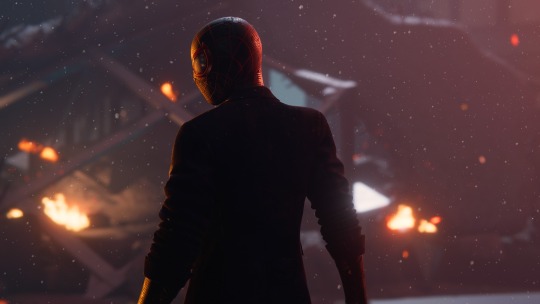
The most impressive thing about Miles Morales is that, despite being a truncated midquel rather than a full-blown sequel, it’s a better game than 2018’s Spider-Man. It’s not because of the instantaneous loading times or the fancy ray-tracing techniques used on the PS5 version of the game. Rather, it’s how it takes the joyride of the original game and hones it into a laser focused experience filled to the brim exclusively with highs. Like Batman: Arkham Asylum going into Arkham City, Miles starts the game off with his mentor’s best abilities and tools. From there, he discovers his own powers, his bioelectric venom strike, which ends up feeling like the missing ingredient from the first game’s combat.
Your open-world playground -- a locale in the Marvel universe called “New York City” -- is exactly the same size as the previous installment, which helps avoid making the game feel “lesser.” But Insomniac wisely consolidated the random crimes Peter faced into a phone app that Miles can check and choose which activity to help out with. Choices like this really trim the fat from the main game and help alleviate “the open-world problem” where the story’s pacing suffers because players are spending hours on end collecting feathers. This is great because Miles’ story is also great. The narrative kicks Peter out pretty early on, focusing on how Miles assumes the role of city protector, primarily focused on his new home in Harlem. Insomniac avoids retreading the same path paved by Into the Spider-Verse by telling a relatable tale where Miles defines his identity as Spider-Man. With a strong cast led by Nadji Jeter as Miles, the game lands an impactful story that weaves its own new additions to Miles’ mythos (light spoiler: I loved their take on The Prowler).
Miles Morales was pure virtualized joy from start to finish. A requirement of the platinum trophy is to replay the entirety of the game on New Game+. I didn’t hesitate to restart my adventure the minute the credits were over. Everything I loved about 2018’s Spider-Man is here: the swinging, the fighting, the gadgets, the bevy of costumes. But it gave me a new element I adore and can’t see Insomniac’s franchise proceeding without: being Miles Morales.
1. FINAL FANTASY VII REMAKE
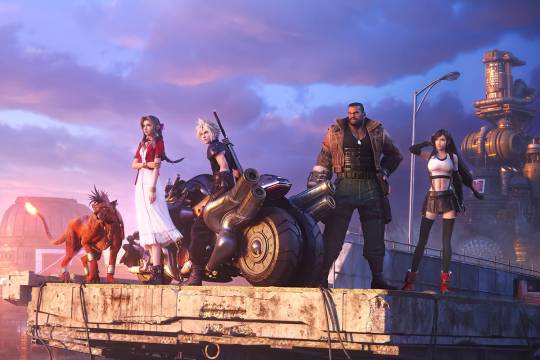
I love subversive media, I do. And Square Enix’s “remake” of one the most beloved video games ever made subverts expectations by openly acknowledging that, yes, the original story you love exists and is consistently referenced in this game. But this is not that story. This is something..else. Because the truth is, SE could never have recreated FFVII and delivered a title that matched the Sacred Game fans created in their heads. That impossible standard is like an imagined deity, given power by feeding on raw nostalgia reinforced by years of word-of-mouth and appearances on Top 100 lists. I’m not saying FFVII is a bad game or that fans give it too much credit. Not at all. There’s a reason it’s so influential -- it’s good! But memory works in a funny way over time. We have a tendency to codify our perception of a thing over the reality of it. The connection we make to certain media, especially when introduced at a young age as FFVII had been to a whole generation of fans so long ago, creates a legend in our heads. Unfortunately, it’s a legend no developer could achieve when tasked with remaking it.
So Square...didn’t. Final Fantasy VII Remake has the same characters, setting, and plot beats as the first third of the original game but it’s not the same game, nor is it a remake of it in the traditional sense. It’s something new. And I fucking love that about it.
Everything is reconfigured, including the combat. After years of trying to merge RPG mechanics with more approachable (and marketable) real-time action (see FFXV and the Kingdom Hearts games for examples), Square Enix finally landed on the perfect balance. You fully control Cloud on the battlefield, from swinging your impossibly huge buster sword to dodging attacks. The ATB gauge (no one knows what the acronym stands for -- that information has been lost to time) gradually fills up, letting unleash powerful moves. But best of all, you fight in a party, and you can switch who to control on the fly.
That may not sound revolutionary, let alone for a Final Fantasy, but each character has a completely unique feel and suite of moves. At times, it feels like playing a Devil May Cry game where you can switch between Dante, Vergil, and Nero on the fly (that’s a free idea, Capcom. Hire me, you cowards). You can soften up an enemy with Cloud’s buster to increase their stagger meter, switch to Barret for a quick gatling barrage, and finally switch to Tifa to crush them with her Omnistrike. You can accomplish this in real-time or slow down the action to plan this out. It’s a great mix of tactics and action that prevents the game from feeling like a mindless hack n’ slash.
What really, really works here is the character work. Each lead walks in tropes first, but the longer you spend with the members of your party, the more their motivations and fears are laid out. You end up having touching interactions with just about the whole main cast. There’s a small segment, after Cloud saves Aerith from invading Shinra guards, that the two make an escape via rooftop.They make light conversation -- small talk really -- but it’s exchanges like this that feel genuine, perfectly framing their characters (stoic versus heartfelt), and grounding an otherwise larger-than-life adventure.
Many bemoaned the fact that FFVIIR only revisits a small portion of the original game, but I think it was a brilliant choice -- to massively expand on areas we only got to see a little of in the original. I honestly didn’t want to leave Midgar. It’s a world rife with conflict and corporate oppression, sure, but Midgar is beautifully realized, from the slums below the plates, populated with normal people trying to make the best of life, to the crime controlled Wall Market, adorned with gaudy lights and echoing honky tonk tunes. It very well may be years before FFVII’s remake saga comes to a close, but if each entry is paved with as much love and consideration and, yes, storytelling subversion as this introductory chapter… It’ll be worth the wait.
8 notes
·
View notes
Text
Collision Course (3/3)
Part 1/3 (First Meetings) Part 2/3 (Follow Through)
Rating: M+, NSFW Corvus and Proxima wind up in another situation involving a wall and a secluded space.
*
Proxima traced the rim of her glass with her forefinger, the tempo of her swirl pitched like an instrument’s tune to the calculations on her mind. The ale in her tumbler had been spiked by the bartender with Jormuan spider venom. She didn’t have to see him in the act to know he had injected the tasteless, colorless toxin into her drink—perhaps he didn’t realize that she ordered a fizzy alcohol because phosphoric acid reacted chemically to what the Shadow Guilds called “Assassin’s Kiss” and produced a faint but subtle scent of cut wood.
She met the bartender’s gaze. He was Aldain, she thought, but perhaps something else from this quadrant—thin and hairless, four eyes and four arms, cleaning two mugs with two rags and two eyes turned down to the task while the other two looked at her apprehensively. Proxima smiled politely and took a sip. She’d nursed the ale slowly over the course of the last half-standard hour. The bartender was glancing at her more frequently as the minutes passed, anticipating the moment when her head would hit the countertop. The venom should have worked by now, he thought; she didn’t have to possess Supergiant’s powers to know his mind, to see the minute tension in his previously relaxed shoulders.
Amateur. If she wasn’t waiting on her next order, she would have leapt over the counter and snapped the prick’s neck.
A familiar figure in black slid into the chair next to her. Proxima wanted to tell him that he shouldn’t be wearing his cloak if he wanted to blend in, even if he had listened to her for once and left the glaive behind; she had braved the situation without her headgear, he could at least do the same. Well, it didn’t matter now. There was already a neurotoxin in her drink.
Proxima crossed one leg over the other and gave her company a coy smile. “Hello, stranger.”
Corvus Glaive’s claws bit into the polished countertop. “It is impolite to allow you to drink alone,” he said. “May I join you?”
She became aware of the wind instruments and drums in the background, and the cold familiarity of Supergiant mentally brushing the back of her mind as she nonverbally requested information Proxima had yet to give. There was the chorus of patrons playing card games and marbles at the long tables out on the floor, the escorts in low tops in the laps of buyers and shady figures passing notes. Maw was amongst one of the clusters, extracting information slowly but surely over a game of Aquila Spit. Dwarf was in the corner pretending to lose a round of Terrappen Checkers to keep pace with the gradual movements of their plan. Supergiant was in the corner by the hallway that led to several back rooms, ensuring that anyone who thought her out-of-place quickly forgot she existed at all.
The bartender dutifully came up between Proxima and Corvus and offered his services. “A drink?” he asked.
“He’ll have what I’m having,” Proxima answered for her companion. “And please, don’t forget the venom.”
The bartender paled. Corvus gave her a knowing look but said nothing as the server hurriedly filled a glass with ale, omitting the Assassin’s Kiss, and dropped it off before the glaive-wielder. Proxima shooed the bartender away with a waft of her hand.
“Updates?” she asked into her drink.
“Our client is…behind schedule. Maw has been trying to deduce whether he’s onto our plan. Supergiant is itching to suck out some minds, and Dwarf believes there is an ex-Kree militant snorting lines in a bathroom stall.”
Proxima pulled her bangs behind her ear. “Everyone is occupied, it seems—at least, then, that leaves some time for you and me.”
Corvus went quiet. Lips pressed pliantly together, gaze set on the bubbles in his glass struggling free. He had been like this since they kissed in the dropship, suddenly cold and cautious. It was difficult to decipher what had been altered between them, and Proxima no longer knew where the line was even though she had been the one who carved it out—post-kiss, breathless, the intimacy they had shared a precursor to a bigger problem. The point had been to address the unspoken thing. Yet the aftermath was thick with friction for what had been weeks now, always one accidental spark away from igniting the whole ship.
It would be easy to say this was something she could live with: this distance, this silence. Proxima realized that it was the manifestation of what the old her would have been happy about, before the companionship that had formed between them despite her disdain for the creature that violated the laws of death, before they kissed—
Corvus Glaive had shut her out.
“Corvus,” she said boldly, “you haven’t been yourself. Is it something I’ve done wrong?”
“What you’ve done?” he echoed, a little too loudly.
Supergiant’s eyes went to them, and Proxima felt Maw prodding the emotions of her mind, wanting to know what happened. Dwarf wasn’t in her line of sight, but she could feel his worried look on her back, perhaps aware of the friction between his brother and her. For a moment that lasted an eternity, neither of them moved.
Corvus exhaled harshly through his nose and put his hand to his forehead as if nursing an ache. “No, not what you’ve done.” He tilted his glass to his lips and drank the ale down in a single round. Then it slipped out, “I regret what I did.”
Proxima’s stomach clenched up and fell low in her belly. Just like her days back home, that bitter pang of rejection, the sting of not being enough. How terrible, how truly tragic, to be so unwanted. “I see,” was all she managed to conjure up, from all the words she wanted to use and all the declarations she could have made. Instead Proxima stood and abandoned him there, even though she knew he would follow.
She went swiftly passed Supergiant, down the long corridor to the back rooms; over her shoulder she heard Corvus say to Supergiant, “Ensure not a soul comes down this way.”
Proxima took the left turn to the end of the hall. To that parallel side, a door labeled “STOCK” in Aldain language, and to her right, plexiglass windows in place of wall panels that overlooked the sprawling metropolis of Alda VI’s capitol city. In the deep dark of night, the buildings and structures ignited like fire with all their luminescent lights, and Proxima could only think of how perfect this place would look if Thanos burnt it down.
“A beautiful sight,” Corvus said from the shadow.
Proxima rolled her shoulder at him.
“I am sorry I upset you,” he continued, “though I meant it—I do regret what I did. Not kissing you, but for allowing it to happen before I understood why I wanted to do so. It was unfair of me to ask that of you, especially when you do not return the desire.”
Proxima faced him. “You don’t know what I want, Corvus Glaive.”
“You’re right,” he said, eyes narrowing dangerously. “Perhaps, neither do you.”
“We kissed. I—wanted to kiss—you.”
“You wanted to prove a point.”
They both fell silent. For a long while they stood, glaring at each other, considering the hundreds of directions this could steer and the millions of timelines it would generate. The familiar tension returned. It was converging on them. A moment before battle, before total bloodshed on the field—the thickness in the air, bodies fighting for carbon and oxygen, the thrill of sinking blade-into-flesh and flesh-into-flesh, tearing each other apart.
“I cannot understand it,” he snarled. “Here we are, again, vying to comprehend the other, and I am flailing helplessly, as if there is something I am doing wrong and cannot find where my judgment errs!”
“Corvus—”
He was already advancing on her. She maintained their distance, not allowing him the chance to overtake her nor the opportunity to assume she would flee, but her back struck the wall and his hands came up to either side of her head to trap her there, between him and the corridor that seemed much too long, claws furling and unfurling with pretense.
“I am a killer of kings,” he hissed. “I am a hunter who ushers in the slaughter of worlds! I am an immortal, blood-thirsty murderer, First of the Dreadlords, leader of the Black Order! And I am brought to my knees in your presence, Proxima Midnight! You make me want to tear the life from your body!”
He was breathing deep, stealing the air from between them. Proxima wanted to believe it was fear she felt then but instead it was—dare she say, fascination? To see him buckled like this, because of her and in spite of her. As if she were a blacksmith scrutinizing her own handiwork, and he were tempered and tortured metal.
“If you do not want a devil, then be done with me! Curse me out and send me away! Free me from this torment!” He sunk pathetically to his knees, fingers digging painfully into her sides, head bowed low in defeat. “Please, My Lady Midnight. End my suffering. Tell me what you want and I will give it to you, everything I am or nothing at all. Just tell me.”
“Corvus,” she tried. “I…”
“Tell me what you want!”
She felt her body tremble. “Stand,” she told him. “I want you to stand. Groveling is beneath you.”
Corvus weakly rose back up to his feet, all conviction departed from his body. Proxima’s hands went to his face. He snarled as she held him, but his threat didn’t meet his gaze; there was pain, his spirit retched in two by the parting of devotion.
“Corvus,” she uttered, and his dark eyes softened. And she asked him, “Why me?”
“I wish I could tell you I didn’t feel this way,” he said thinly. “I wish I could control my eyes and my desires and my thoughts, I wish I could explain that which makes me tremble in your sight. All I understand is how pathetic I’ve become, and this deep and terrible hole has rendered itself through my chest as if I’ve died for the first time all over again. I know not why it is you, but it is—you.”
Proxima’s heart was lifted in her chest. She put her head to his neck, her arms around his back and pulled him in to embrace his warmth and take in the scent of blood in the worn fibers of his cloak. He tensed under her touch.
“You truly are the devil,” she uttered, “to make me feel this way about you.”
Corvus relaxed in her arms. Slowly, he put his hands to her hips, took her closer and buried his face in her shoulder, inhaling sharply, committing her aroma to memory. “For all my life, I’ve known what to do. With you, I am lost.” His claws pressed systemically down into her skin as if testing her resolve. “My dear Midnight, you can have anything you desire, everything I am—all of it, it is yours.”
He is truly dense, she thought. “Do you remember what I told you, that day in the ship?”
“I do.”
She parted from him, her palm returning to his cheek. “Then why am I still waiting for you to take me?”
This time, when they kissed it was different. It was the moment of agonizing slowness before the collision, the half-second of timeless thought between an impact and the explosion—so when their lips met they fell into each other, vying for control, no longer needing to know but simply needing. Sharing skins and sharing tongues. The clockwork of anatomical directive.
Proxima was pushed against the wall until it hurt, hands fisted in his pitch-black cloak, and she felt his touch everywhere. On her back, her hips, palms gliding down the curve of her rear to the thick of her thighs. He was memorizing her. A quick study—noting what made her twitch, what made her moan into his mouth; her stomach coiled in the pit of her torso, and heat pooled deep between the apex of her legs.
Corvus went to her neck and breathed in deep. A hunter, a creature of instinct, he could smell her arousal as it emitted from her glands like a flower’s fragrance. “Is that what I do to you?” he mused. His grin displayed sharp, predatory teeth; the threat of how easily he could sever flesh from bone, yet Proxima’s blood sang with excitement.
“You said you’ve never done this before,” she shot back, undoing the zipper to the front of her suit and exposing vibrant blue skin.
Corvus scoffed and worked open the hinge of his belt. “I said I have never had feelings for another. Sexual desire is not synonymous with romance on my home world. It is also a sign of trust and companionship, two souls fulfilling similar needs.”
“Then you will be no less than a good lay—”
“No, Proxima Midnight, I will be the best. It is only what you deserve, and it is what I will give.”
“Finally,” she said, hand on the back of his neck, “you’ve listened to me.”
Corvus reclaimed her mouth. He unwound as they defected back to primal urgency, emitting growls of approval from the glottis in his throat as she returned the favor and allowed her hands access to the expanse of his torso, his hips, shucking up the loosened belt to dip lower and—oh, he was bigger than expected, especially for such a lithe creature. He undid more of the zipper along the front of her suit. His teeth scraped along the expanse of her neck, and he sucked and licked and nipped his way down the length of her artery, begging for that rush of mortal blood beneath.
Everything about him was rough. Jagged features, claws and teeth, a padded tongue; the texture of it was made apparent as he ran it up the valley of her breasts, and if she hadn’t been aware of its rough properties before, gods she certainly was now. Her foremost thought was of him kneeled between her legs, a subtle tilt in his eyes to watch her as he worked and that devilish tongue thrusting in and up, challenging her: come for me, my beautiful Midnight. Tell me how good I make you feel.
“You’re going to be the death of me,” she uttered breathlessly, splaying open her chest piece and allowing her breasts the luxury of the cool air.
Corvus snarled low, humming with arousal. “You’ll find the feeling is quite mutual.” He undid the clasps of his vambraces and dropped them carelessly to the floor, eyes daring to never leave hers. His hands were tipped by nails meant for flaying skin, yet they were gentle when they skated across the mesa of her abdomen, dipping low to her naval. Slipped so easily under her clothes and to the joint of her hips.
The pads of his fingers found her clit. She sucked in a deep breath, spread her legs a bit; he took his time learning, alternating between rubbing small circles in her bud and tracing her folds, seeing what she liked best and how and spreading her wetness as he went. Proxima’s head rolled against the wall. Her eyelids slit shut to amplify the sensation. Stars above, with him, it felt like too much and not enough.
Corvus pulled his hand away, and she groaned at the loss of contact. He got down on his knees again. His heated breath was against her hips, teeth nipping at the obsidian material of her suit. Even through its thick composition, the taste of her arousal was apparent. So, very apparent. Proxima heard him snarl before his hands dug desperately into her thighs.
“I need to taste you,” he hissed out, and she shivered with anticipation.
And—
Something cold went through their minds. [Our client is here], Supergiant said to them both. Proxima quickly slammed up a mental barrier that was ineffectual if the parasite wanted to really get in her head, and whatever Supergiant told Corvus made him scoff. Unfortunately, it was enough of an interruption that the friction faltered and the air in the corridor became frigid when it had been oh so warm until now.
Proxima grumbled with annoyance. There Corvus was, on his knees in worship, and she couldn’t capitalize on the opportunity with their “client” now somewhere out on the floor. “Yes, well,” Corvus said, and gathered his vambraces. “I suppose we must handle this.”
“Of course,” she muttered, unable to repress her acute disappointment, and fervently began to fix herself.
Corvus gave her a small smile, displaying teeth that somehow seemed less predatory than they had before. “This client will give us the information we need,” he said, tracing her lips with the tip of his claw, “but after that? Well, there will be no evidence to his whereabouts. There will be no proof that we stole him away to our ship, and no one will know how long he survived in pure agony as we skinned him alive. Does this appease you?”
Proxima practically purred and pulled Corvus against her. “So far, but how does this brilliant plan of yours conclude?”
“Why, we will fuck like beasts in heat. Perhaps right there, on the floor or against the wall or in the bedchambers, if you prefer. Or, if I cannot help myself—especially if I cannot help myself, all three.” He leaned in close. “This time, My Lady Midnight, and for as long as you will have me, I will follow through.”
Her heart swelled deep in her chest. And she smiled. And she kissed him.
And Proxima Midnight fell in love.
#corvus glaive#corvus x proxima#proxima midnight#proximus#hope it was worth the wait! look i even included angst
40 notes
·
View notes